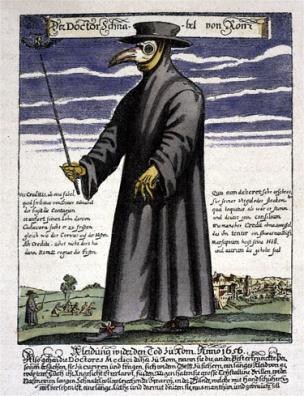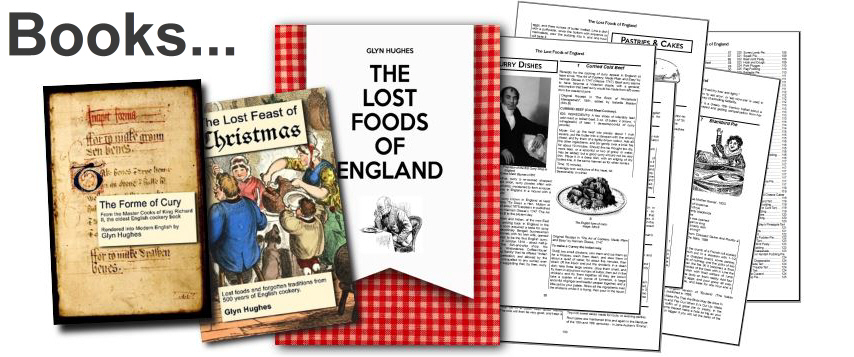

|
 Woodland herbs such as rue, rosemary, sage, sorrel, celandine, mugwort, the tops of red brambles, pimpernel, Balm, Angelica, (Digby 1669, Family Guide 1747) steeped in white wine for several days, then distilled.  A 16th Century Plague Doctor with his beak of fragrant herbs Samuel Pepys refers to this supposed remedy in his diary entry for July 20, 1665: "So walked to Redriffe, where I hear the sickness is, and indeed is scattered almost every where, there dying 1089 of the plague this week. My Lady Carteret did this day give me a bottle of plague-water home with me."  Original Receipt in 'The Closet Of Sir Kenelm Digby Knight, Opened ' (Digby 1669) Original Receipt in 'The Closet Of Sir Kenelm Digby Knight, Opened ' (Digby 1669)TO MAKE PLAGUE-WATER Take a pound of Rue, of Rosemary, Sage, Sorrel, Celandine, Mugwort, of the tops of red brambles of Pimpernel, Wild-dragons, Agrimony, Balm, Angelica of each a pound. Put these Compounds in a Pot, fill it with White-wine above the herbs, so let it stand four days. Then still it for your use in a Limbeck. ANOTHER PLAGUE-WATER Take Rue, Agrimony, Wormwood, Celandine, Sage, Balm, Mugwort, Dragons, Pimpernel, Marygold, Fetherfew, Burnet, Sorrel, and Elicampane-roots scraped and sliced small. Scabious, Wood-betony, Brown-mayweed, Mints, Avence, Tormentil, Carduus benedictus, and Rosemary as much as of anything else, and Angelica if you will. You must have like weight of all them, except Rosemary aforesaid, which you must have twice as much of as of any of the rest; then mingle them altogether and shred them very small; then steep them in the best White-wine you can get, three days and three nights, stirring them once or twice a day, putting no more wine then will cover the Herbs well; then still it in a Common-still; and take not too much of the first-water, and but a little of the second, according as you feel the strength, else it will be sower. There must be but half so much Elicampane as of the rest. This 1776 advertisement shows that even though Mr O'Brian may have formerly been an apothecary, his Dublin shop was selling 'Plague Water' alongside Uiscebeatha (whiskey) and liqueurs, rather then medicines, suggesting that by then it was not necessarily believed to be curative. For other (supposedly) medicinal drinks, see the list at.. Aqua Mirabilis  |
|
MORE FROM Foods of England... Cookbooks ● Diary ● Index ● Magic Menu ● Random ● Really English? ● Timeline ● Donate ● English Service ● Food Map of England ● Lost Foods ● Accompaniments ● Biscuits ● Breads ● Cakes and Scones ● Cheeses ● Classic Meals ● Curry Dishes ● Dairy ● Drinks ● Egg Dishes ● Fish ● Fruit ● Fruits & Vegetables ● Game & Offal ● Meat & Meat Dishes ● Pastries and Pies ● Pot Meals ● Poultry ● Preserves & Jams ● Puddings & Sweets ● Sauces and Spicery ● Sausages ● Scones ● Soups ● Sweets and Toffee ● About ... ● Bookshop ● Email: [email protected] COPYRIGHT and ALL RIGHTS RESERVED: © Glyn Hughes 2022 BUILT WITH WHIMBERRY |